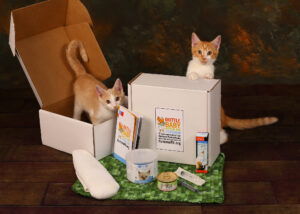by Leann Quire, Director of Shelter Operations, Humane Pennsylvania
Last week, Deb Dreisbach won the American Red Cross Animal Rescue Hero award. Each year the American Red Cross awards this honor to either an animal who protected a human in a time of need, or an individual who protected an animal from pain or suffering. This year the award went to an amazing individual and we want to take the time to congratulate this beautiful person who has helped our organization to save numerous lives, and is continuing to save more and more lives in our community.
Deb, or Debbie as many of us refer to her by, worked at the Humane Society of Berks County in 2007 and assisted as a front office employee. As an employee, Debbie was able to get a full view of what went on in an animal shelter. Over a decade ago, I can tell you that it wasn’t a pretty place. Debbie was upset to see that many animals were being euthanized at that time and there was just not enough space for the ones that kept coming in and needed help, especially cats. Being the compassionate and intelligent person she is, Deb knew that more needed to be done to stop the flow of animals from entering the shelter in the first place.
Knowing the importance of spay and neuter, Debbie worked with No Nonsense Neutering and found a location in Reading, at 1500 Frush Valley Road, for a high-volume spay and neuter clinic. She became a board member for No Nonsense Neutering and played an active role to make sure they helped become a part of the solution to increase spay and neuter in Berks County and decrease animal intakes in the shelters.
 Debbie became the go-to person for feral and kitten assistance and advice. She created a barn home program that helped relocate numerous feral cats escape euthanasia and find their way out of the shelter and into alternative placement housing. Although she is no longer a Humane Pennsylvania employee, Debbie is frequently a friendly and welcoming face we still see around our veterinary hospital and shelter in Berks.
Debbie became the go-to person for feral and kitten assistance and advice. She created a barn home program that helped relocate numerous feral cats escape euthanasia and find their way out of the shelter and into alternative placement housing. Although she is no longer a Humane Pennsylvania employee, Debbie is frequently a friendly and welcoming face we still see around our veterinary hospital and shelter in Berks.
Whether she is at a vet appointment, picking up a three legged foster, transporting a feral to their new home, or performing feral cat workshops with our staff, Debbie is still an integral part of our organization. As someone who has had the pleasure of knowing Debbie for over a decade, I can attest that Debbie is beautiful inside and out. She always has a story about her adventures with trapping that will make you laugh until your side hurts, but the next minute she can have you in tears with how she managed to save an animal that anyone else would have thought was not able to be saved.
She is purely a good human.
I was fortunate to attended two different conferences over the past few months, which allowed me to be in the same room as hundreds of other animal welfare professionals, people with similar passions and dreams. It made me realize how important it is to appreciate those around you, fighting the same fight. At these conferences I watched connections happen between complete strangers who knew nothing about the other person, yet knowing that one of them had a specific need to help animals, and the other person had a solution to that problem, was enough to bring the two together.
The great relationship between Debbie Dreisbach and our organization has created so many lifesaving opportunities for animals of all sorts. A shared goal and innate desire to help others is what sets a foundation to move forward together.
Jim Stovall said,
“You need to be aware of what others are doing, applaud their efforts, acknowledge their successes, and encourage them in their pursuits. When we all help one another, everybody wins.”
This is a very moving statement, because in animal welfare we all share many of the same goals and too often we forget we are all in it for the same reason. If we can lift each other up, support one another, and work together, then we can do more and better things.
Debbie Dreisbach, you have been an employee, rescue partner, foster, and best of all, friend to Humane Pennsylvania for over a decade. We are so thankful to have someone like you in the community to help the people and animals have better lives. We are so proud of you and want to congratulate you on your well-deserved American Red Cross Animal Rescue Hero award.
 You may recall Doug, now Milo, a year old Shiba Inu, was found by a local police officer and brought to Humane Pennsylvania. He was in poor condition and suffering from an extreme case of mange. To give him the best chance at a full recovery, Milo was placed on an intensive treatment plan. After months of care he showed improvement and was cleared for adoption. Thankfully within a few days of becoming available, he was adopted.
You may recall Doug, now Milo, a year old Shiba Inu, was found by a local police officer and brought to Humane Pennsylvania. He was in poor condition and suffering from an extreme case of mange. To give him the best chance at a full recovery, Milo was placed on an intensive treatment plan. After months of care he showed improvement and was cleared for adoption. Thankfully within a few days of becoming available, he was adopted. We are so grateful to the police officer who saved him from deplorable conditions and to Milo’s new family, for giving him a second chance at life. Visit our website to learn more about ways that you can help save pets like Milo.
We are so grateful to the police officer who saved him from deplorable conditions and to Milo’s new family, for giving him a second chance at life. Visit our website to learn more about ways that you can help save pets like Milo.





